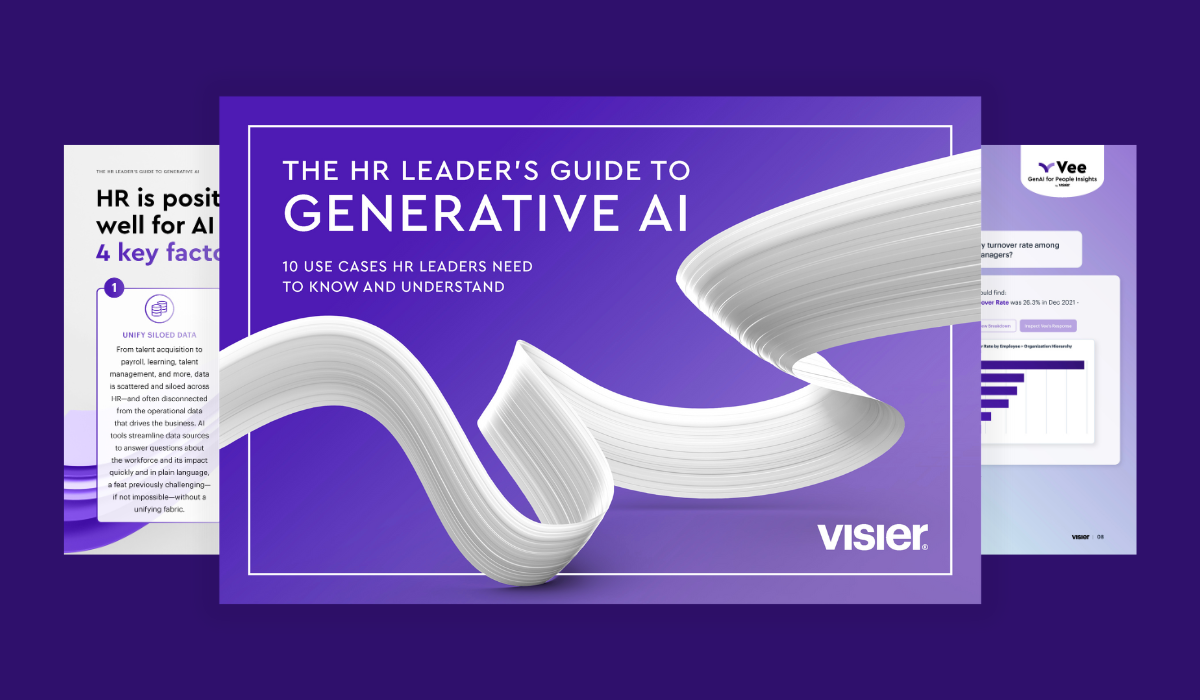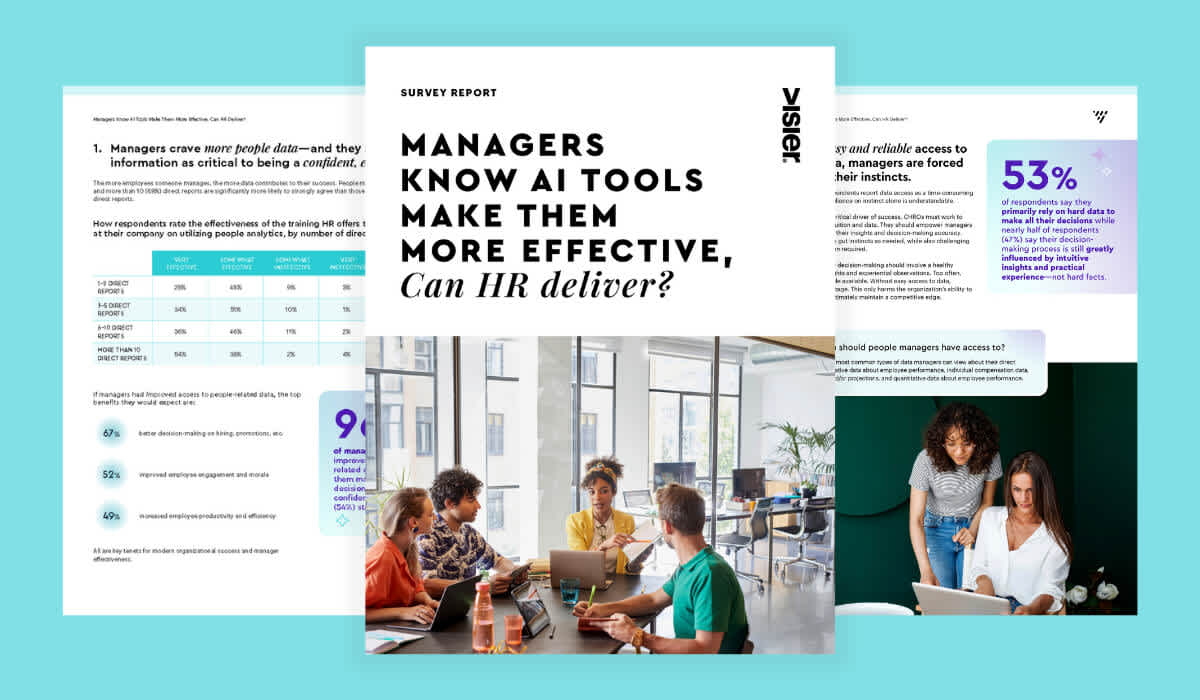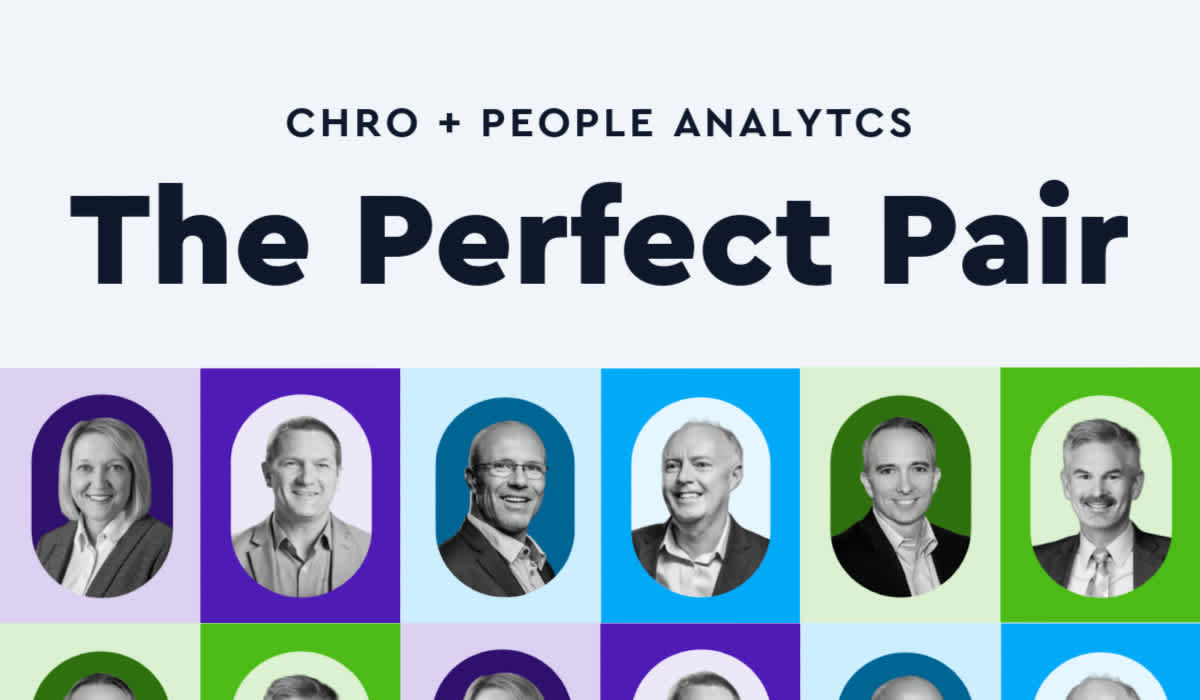10 Questions Vee Can Answer for CHROs in Seconds
Visier's genAI assistant, Vee, answers CHRO questions about the workforce—quickly and accurately. Here are 10 real examples of answers from Vee.

This post is part of a series of questions to ask generative AI for people analytics. Explore other posts in the series to learn which questions AI can answer for workforce planning leaders, compensation and total rewards teams, HRBPs, people analytics leaders, and frontline managers.
Generative AI, or GAI, has taken the world by storm over the past year. It’s a technology that has the potential to simplify and streamline all sorts of processes, to take on mundane tasks that can free staff up for more challenging assignments, and to reveal insights that might have otherwise remained hidden in masses of data.
In fact, a study by McKinsey Global Institute predicts that by 2023, GAI can automate 30% of hours worked today. In addition, they report that 40% of businesses expect to invest more in AI overall and 28% say GAI use is on their board’s agenda.
Visier’s generative AI assistant, Vee, is poised to take on people insights, providing plain-language answers to everyday questions from HRBPs, line managers, and anyone with the right permissions. Vee can handle some of the most pressing questions CHROs have about the people component of their organizations—answering complex questions that could take a human analyst days, weeks, or even months to discover.
Here, we’ll first take a look at some key reasons to drive the adoption of GAI in HR. Then we’ll offer 10 specific questions that CHROs can ask Vee—questions that can give them insights into people operations to help improve productivity, engagement, longevity, and more—and show real examples of how Vee would answer.
![[ANIMATED SHORT] CHRO Questions Vee Answers](https://images.ctfassets.net/lbgy40h4xfb7/1o85kzcXWAMAxqTT9fjDn1/807d9b5560040f14b90a06bb25084e77/ask-vee-thumbnail.jpg?w=1200&h=700&fl=progressive&q=50&fm=jpg)
3 reasons to drive adoption of GAI in HR
There are three “big buckets” of benefits for the adoption of GAI in HR: productivity, addressing talent and skills scarcity, and improving manager effectiveness.
1. Productivity
GAI represents an opportunity to shift the productivity curve in unprecedented ways, unlocking a new wave of output, efficiency, and growth in corporate performance. GAI will allow routine human tasks to be automated and nonroutine human tasks to be supercharged, driving exponential growth in productivity and output.
McKinsey & Company estimates that GAI could have a $580 billion productivity effect; Goldman Sachs suggests that GAI could raise global GDP by 7%.
2. Talent and skills scarcity
Companies can no longer count on the market availability of the talent and skills they need to grow and compete to survive and thrive. A scarce supply of people resources will drive urgency toward upskilling existing talent and using technologies like GAI to take the tedium out of tasks that can easily be augmented, freeing staff to focus on more rewarding work. A study by PwC found that 74% of CEOs are concerned about the availability of key skills. The good news, though, is that 93% of CEOs who have introduced upskilling programs see increased productivity, an improvement in talent acquisition and retention, and a more resilient workforce.
3. Manager effectiveness
Giving managers the ability to ask questions and get answers only on what they need when they need it will increase uptake because they won’t need to wade through irrelevant information—or wonder where to find it.
Leader and manager development is the top priority for HR leaders in 2024, according to Gartner. That really comes as no surprise. The management landscape has been impacted significantly since the pandemic with a sudden need to manage in in-person, remote, and hybrid settings. In addition, advances in technology—including GAI—have created additional demands and the need to learn in real-time. Even the more experienced managers need reskilling and upskilling to manage in this environment.
In each of the aforementioned areas GAI, like Visier’s Vee, offers the ease of access and insights to navigate these crucial challenges.

10 questions CHROs can ask Vee
On any given day CHROs have myriad questions they need answers to—fast. Vee can deliver rapid responses in real-time during the course of a leadership meeting, for instance, and then it will offer additional suggestions to drill down even deeper. Here are some examples of the types of questions that Vee can answer for HR leaders instantly:
1. In which locations are our salary costs rising the fastest?

For many organizations, salary costs represent a big chunk of the organization’s budget. Using people efficiently can help manage those costs so they are being allocated and implemented cost-effectively. The ability to immediately see where adjustments may be necessary can help you ensure you’re managing people resources in a strategic way.
2. How are we performing on time to hire?

Time to hire matters regardless of the hiring environment. Top talent generally has their pick of offers—you want yours to arrive fast and first! Understanding the efficiencies and inefficiencies of your recruitment process can help you drive out waste while also enhancing the candidate experience and allowing you to fill positions promptly.

3. Which business unit leaders have higher than normal increases in resignation?

Turnover represents a significant cost to organizations in terms of lost intellectual property, and recruitment and training costs. Understanding where in your organization resignation rates are trending higher can provide early warning signs where intervention may be needed.
4. What is our current headcount and how has it changed since last month?
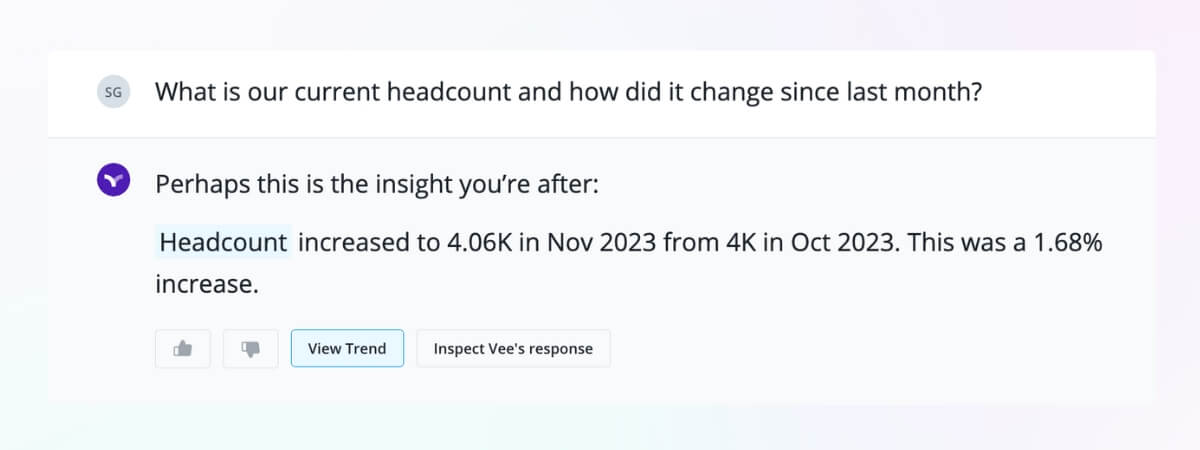
Workforce size and composition shifts over time, and, left unmanaged organizations are at risk of overpaying for talent or failing to allocate talent most cost-effectively. Quickly understand how—and where—hiring or restructuring could help better align with business needs.
5. Which managers have the highest manager effectiveness score?

Tracking manager effectiveness at a glance is possible when the proper metrics are defined and assigned to create a “score,” as in the example above. As the CHRO, determining what manager behaviors are most important to the organization will provide the foundation for establishing a way to assess your people leaders. See who is doing well, and who might be scoring lower, and then dive in deeper by individual or team to learn what is affecting their scores.
6. Where are the biggest attrition risks?

Being able to understand where you may be at risk for attrition can help you be proactive in heading off the potential for resignations that can be costly and disruptive. Identifying attrition hotspots can help you quickly take action to improve satisfaction and engagement. The drivers chart above shows the groups that decrease the attrition rate on the left, and the groups that increase it on the left. From here, explore any specific demographic to learn more about why certain groups are included in order to mitigate anything concerning.

7. What percentage of managers are women?
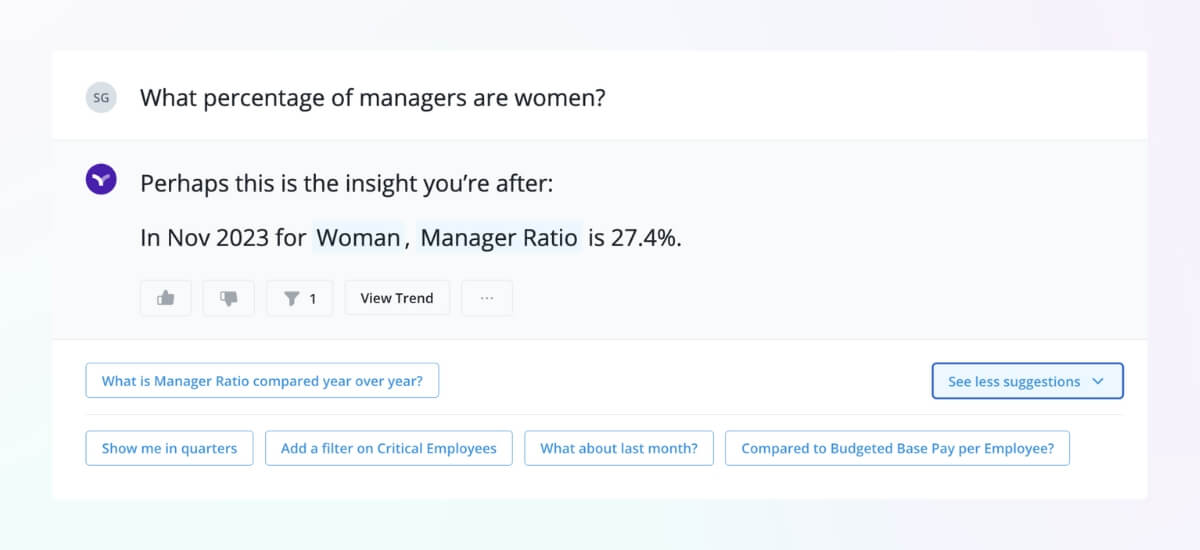
Quickly seeing the gender composition of your organization can help you track and assess DEIB initiatives and identify potential areas of improvement for better gender representation and equity across all job tiers. In the above example, Vee suggests additional questions to further investigate the insight.
8. Show me employee movement and total headcount.

Understanding internal talent movement can help you quickly see how headcount is shifting across the organization to help determine where efficiencies could be gained, or best practices gleaned. It can also offer insights into preferred career paths for employees.
9. Tell me more about “employee name?”

The ability to drill down into individual employee performance and metrics can identify areas where reskilling or upskilling might be in order, or where opportunities for professional development might come into play. You can quickly see the relevant metrics for a single employee to identify both the potential for turnover—and the potential for promotion. For instance, if you know a manager may be a flight risk, you can investigate potential root causes—is it too many direct reports or a compa-ratio that is too low?
10. How does sales performance vary across geographic regions?
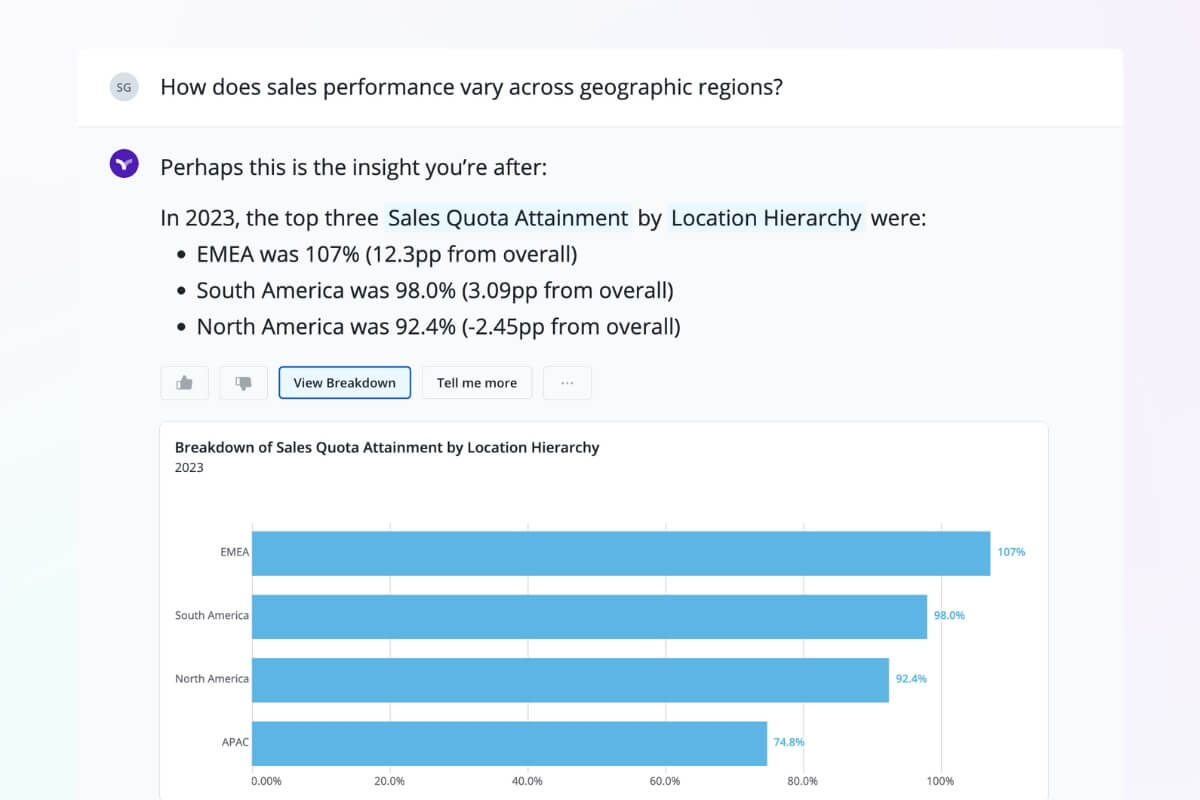
While this may seem like a question sales leaders might ask, CHROs can also gain value from understanding where HR strategies like training or incentives could be better aligned with sales performance across regions.
These questions are just the tip of the iceberg. It’s not hard to see how Visier’s Vee could be used to help automate and enhance processes, tackle talent and acquisition challenges, and improve manager effectiveness.
Vee has no learning curve and can begin answering all of your HR and people-related questions immediately through a user-friendly interface that even those without high-level AI and analytics skills can use.

Generative AI for people analytics and HR
To keep up with the future of work, HR leaders need a strategy that's agile, adaptable, and rooted in data. GenAI can help close the gap between people data and business data. Ian Cook and Robert Sullivan share how.
Vee Boards are AI-augmented dashboards tailored to specific issues of top concern to the C-suite executives. Learn more about them here.
Visier's genAI assistant, Vee, answers questions for line managers about their teams in seconds. Here are 10 real examples of answers from Vee.
Generative AI innovations like digital assistants are changing the way we work, and pose significant security challenges. Are they secure enough to use with people data?
